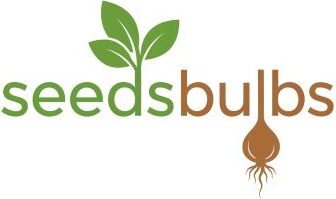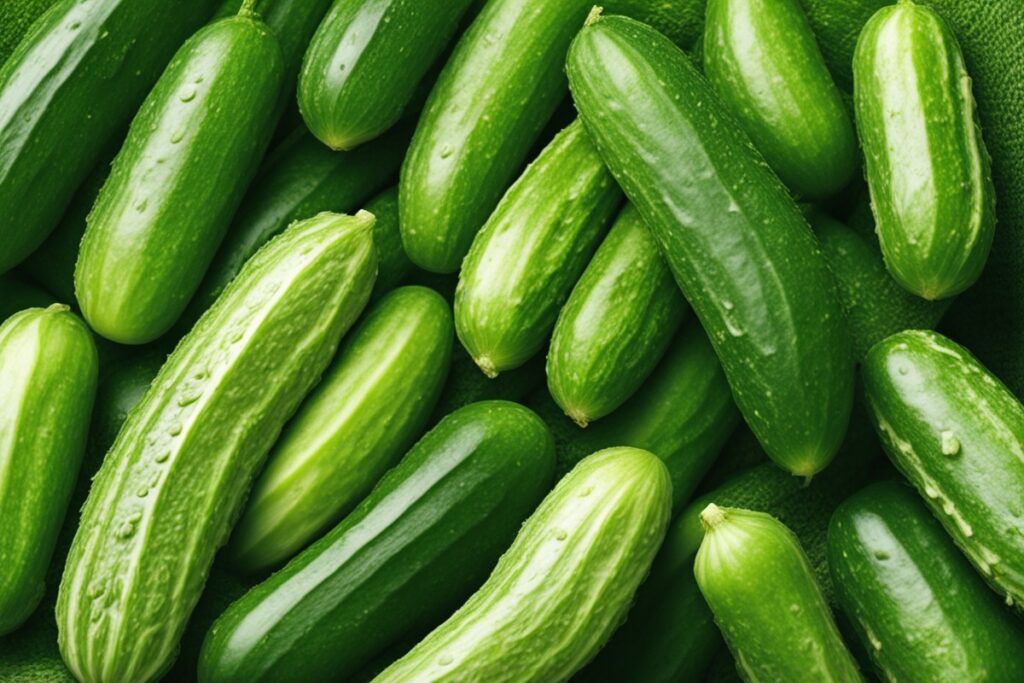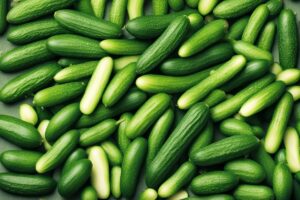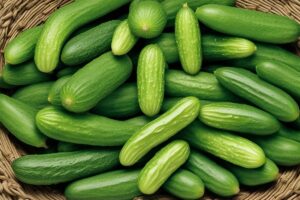Growing your own cucumbers is one of those simple joys in life that never gets old. There’s something magical about plucking a crisp, fresh cuke straight from the vine on a warm summer day, isn’t there? But let’s be real—starting with the right seeds is half the battle. If you’re on the hunt to buy organic cucumber seeds online, you’ve landed in the right place. I’ve been gardening for over a decade, and I’ve learned a thing or two about sourcing quality seeds that don’t just sprout but thrive. In this post, I’m diving deep into everything you need to know about buying organic cucumber seeds online—from why organic matters to where to shop and how to avoid common pitfalls. Stick with me, and I’ll share practical tips, personal stories, and expert-backed insights to help you grow a bumper crop.
Why Choose Organic Cucumber Seeds?
Let’s start with the basics: why go organic in the first place? Organic cucumber seeds come from plants grown without synthetic pesticides, fertilizers, or genetically modified organisms (GMOs). That means you’re starting with a cleaner slate—seeds that haven’t been exposed to chemicals that might linger in your soil or, worse, your harvest. I remember the first time I switched to organic seeds; I was skeptical, thinking, “Will they even germinate as well?” Spoiler: they did, and the flavor of those cucumbers was unmatched—crisp, earthy, and just a tad sweeter than anything I’d grown before.
Beyond taste, choosing organic supports sustainable farming practices. According to the University of California’s Agriculture and Natural Resources division, organic farming promotes biodiversity and soil health, which can lead to stronger plants over time. Plus, if you’re like me and worry about the long-term impact of chemicals on your family’s health, organic seeds give you peace of mind. So, when you’re looking to buy organic cucumber seeds online, know that you’re investing in more than just a packet of seeds—you’re voting for a healthier planet.
What to Look for When You Buy Organic Cucumber Seeds Online
Shopping for seeds online can feel like navigating a jungle. With so many options, how do you know you’re getting the real deal? First off, always check for certification. Look for labels like USDA Organic or certifications from reputable bodies like the Organic Materials Review Institute (OMRI). These ensure the seeds meet strict organic standards. I once ordered a batch of “organic” seeds from a sketchy site, only to find out later they weren’t certified. Lesson learned: don’t skimp on due diligence.
Next, pay attention to variety. Cucumbers come in slicing, pickling, and even burpless types—each suited for different needs. Read the product descriptions carefully to match the seed to your climate and garden space. For instance, if you’re in a short-season area like I was in northern Minnesota years ago, go for early-maturing varieties like ‘Marketmore 76.’ Lastly, check reviews. Other gardeners’ experiences can clue you in on germination rates and seller reliability. A little research upfront saves a lot of heartache later.
Where to Buy Organic Cucumber Seeds Online: Trusted Sources
Now, where should you shop? I’ve spent years testing seed suppliers, and I’ve got a few go-to’s that consistently deliver quality when you want to buy organic cucumber seeds online. Sites like Baker Creek Heirloom Seeds and Seed Savers Exchange are goldmines for organic, non-GMO options. Baker Creek, for example, offers rare heirloom varieties with detailed growing tips right on their site. I’ve ordered their ‘Boston Pickling’ seeds multiple times, and they’ve never let me down—vigorous vines and prolific yields every time.
Another solid option is Johnny’s Selected Seeds, known for catering to both home gardeners and small-scale farmers. Their organic cucumber seed selection is vast, and they provide germination guarantees, which is a lifesaver if you’re new to gardening. If you’re looking for affordability, check out High Mowing Organic Seeds—they often have bulk options for those of us with bigger plots. Pro tip: sign up for newsletters from these companies. I’ve snagged some killer discounts during off-season sales just by being on their email list.
Benefits and Challenges of Buying Organic Cucumber Seeds Online
Buying seeds online has its perks, no doubt. Convenience tops the list—you can browse hundreds of varieties from your couch, often with more selection than your local nursery. Plus, many online retailers provide detailed growing guides, customer support, and even community forums. I’ve lost count of how many times I’ve turned to Seed Savers Exchange’s blog for troubleshooting weird cucumber vine issues. That kind of resource is invaluable.
But it’s not all sunshine and roses. Shipping delays can mess up your planting schedule—imagine waiting weeks for seeds only to miss your ideal sowing window. And then there’s the risk of getting dud seeds or dealing with shady sellers. I once ordered from a lesser-known site, and half the packet didn’t germinate. Frustrating? You bet. To avoid this, stick to reputable sources, and always double-check return policies. Weighing these pros and cons helps you make smarter choices when you buy organic cucumber seeds online.
Tips for Planting and Growing Organic Cucumbers
Alright, you’ve got your seeds—now what? Planting organic cucumbers isn’t rocket science, but a few tricks can boost your success. Start by timing it right. Cucumbers love warmth, so wait until soil temperatures hit at least 60°F (15°C). I learned this the hard way after planting too early one spring; the seeds just sat there, mocking me. If you’re in a cooler zone, consider starting seeds indoors 3-4 weeks before your last frost date, then transplant them outside.
Soil prep is key. Mix in plenty of compost or well-rotted manure—cucumbers are heavy feeders. Aim for a pH between 6.0 and 7.0, as advised by Cornell University’s gardening resources. Space plants about 12-18 inches apart if you’re trellising (which I highly recommend to save space and reduce pest issues). Water consistently—about an inch per week—and mulch to retain moisture. One summer, I skipped mulching, and my plants suffered during a heatwave. Never again. Oh, and keep an eye out for pests like cucumber beetles. A simple neem oil spray, used sparingly, can work wonders without compromising your organic ethos.
How to Store and Save Organic Cucumber Seeds for Future Seasons
Here’s a little secret: you don’t always have to buy organic cucumber seeds online year after year. Saving seeds from your harvest is not only cost-effective but also deeply satisfying. Pick a fully ripe cucumber—think overripe, almost yellow—and let it sit for a few days to soften. Scoop out the seeds, rinse off the pulp, and dry them thoroughly on a paper towel for a week or so. I’ve been saving seeds this way for years, and it feels like a little act of rebellion against overbuying.
Store them in a cool, dry place in an airtight container. Label them with the variety and year—I can’t tell you how many times I’ve mixed up unlabeled packets. Properly stored, cucumber seeds can remain viable for 5-10 years, though germination rates drop over time. The Missouri Botanical Garden notes that testing a few seeds for viability before planting a full batch is a smart move. This way, you’re not just growing cucumbers; you’re building a legacy of self-reliance.
References
- University of California Agriculture and Natural Resources – Cucumber Growing Guide
- Cornell University Gardening – Growing Cucumbers
- Missouri Botanical Garden – Seed Saving Guide
- University of Minnesota Extension – Growing Cucumbers
- Royal Horticultural Society – Growing Cucumbers
Disclaimer: This article is for informational purposes only, based on general research and personal experience in gardening. It is not intended to serve as a substitute for professional advice. Gardening conditions, techniques, and outcomes can vary widely based on location, climate, and individual practices. Always consult a qualified professional, such as a local agricultural extension agent or certified horticulturist, for personalized guidance tailored to your specific needs and circumstances. The information provided here is meant to inspire and educate, but it should not be taken as definitive or universally applicable. Use discretion and conduct your own research before making decisions about seed purchases or growing practices.
This content is for informational purposes only and not a substitute for professional advice.



